Unit 2 Lesson 11 Lily Learns about China !同步新授课件 (共24张PPT)
文档属性
| 名称 | Unit 2 Lesson 11 Lily Learns about China !同步新授课件 (共24张PPT) |

|
|
| 格式 | ppt | ||
| 文件大小 | 772.0KB | ||
| 资源类型 | 教案 | ||
| 版本资源 | 冀教版 | ||
| 科目 | 英语 | ||
| 更新时间 | 2022-06-02 00:00:00 | ||
图片预览

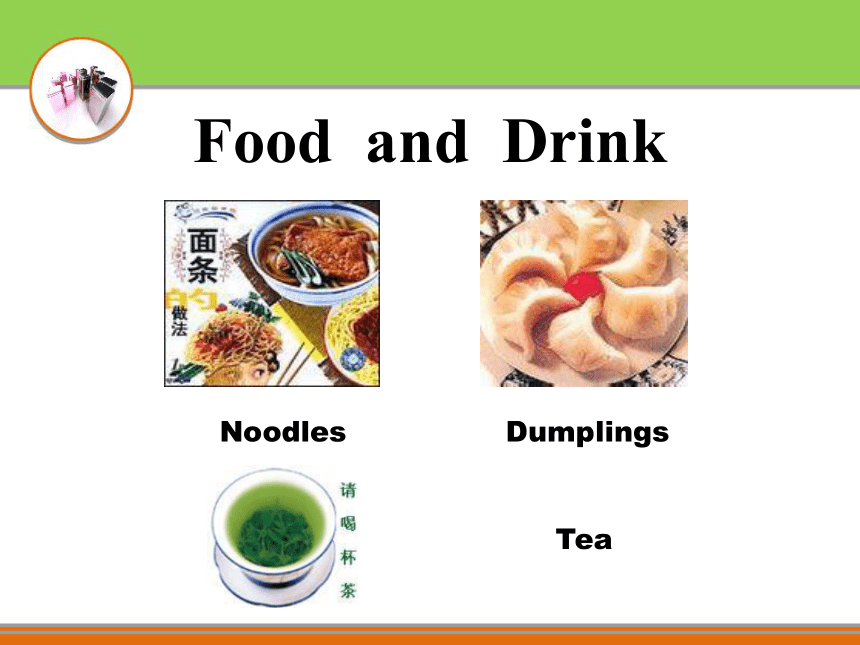
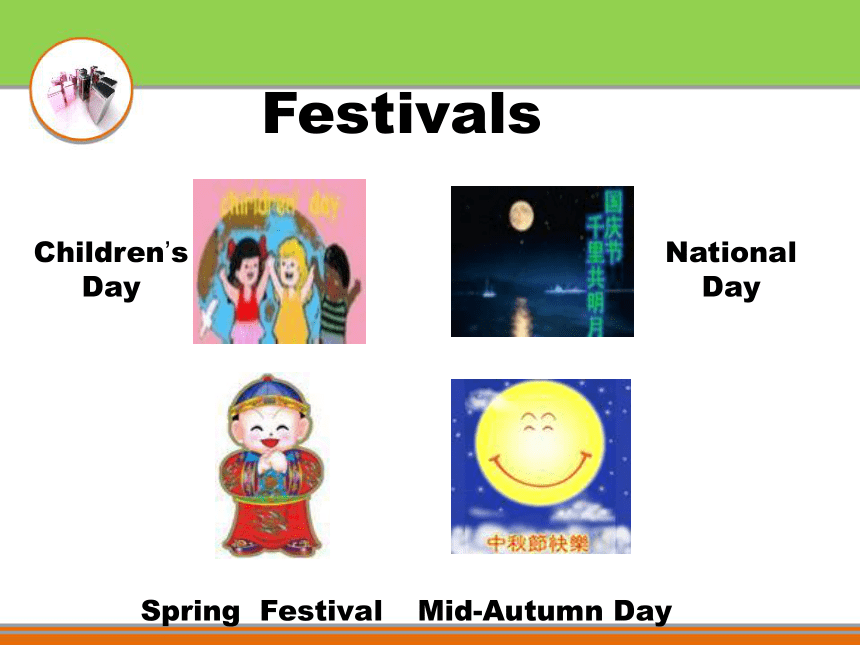
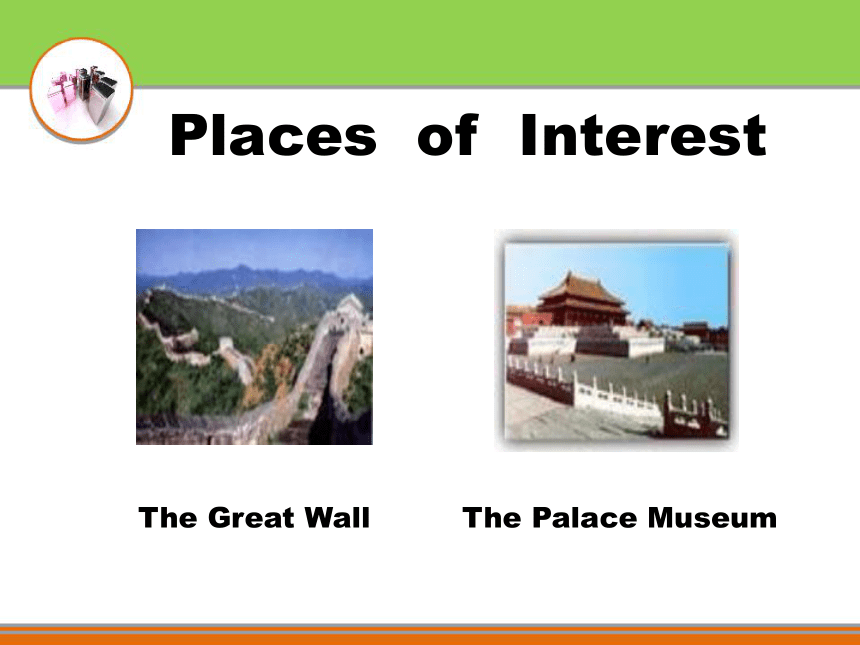
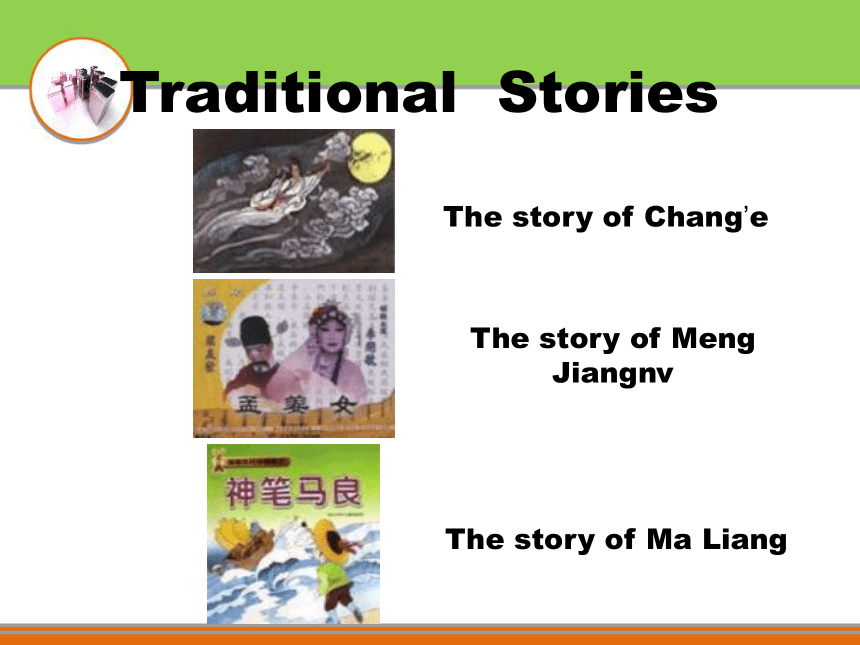
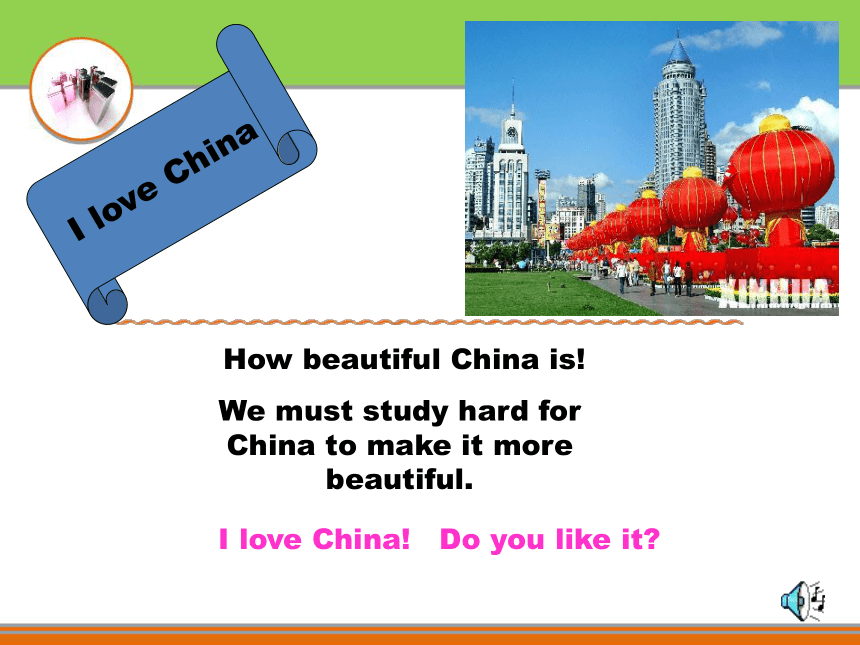
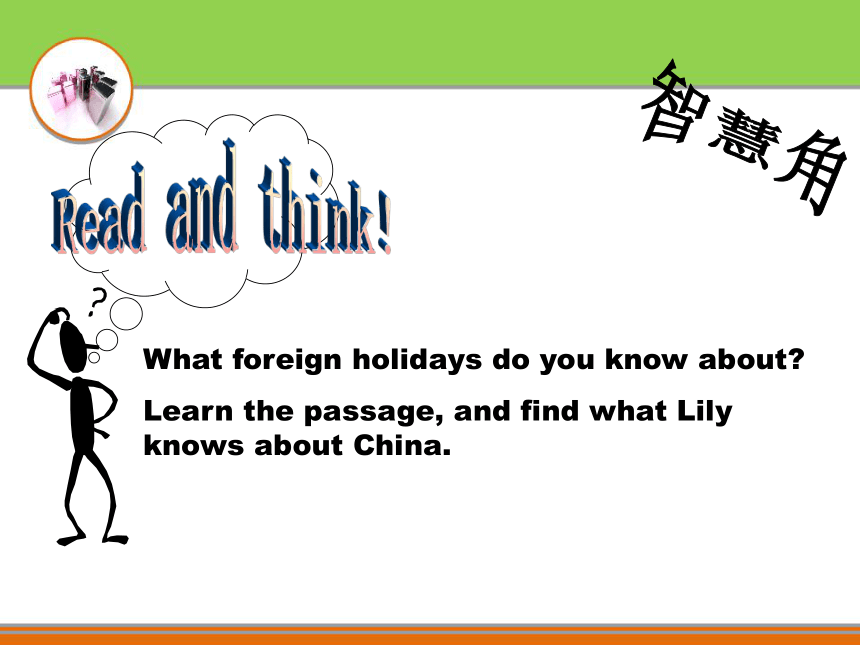
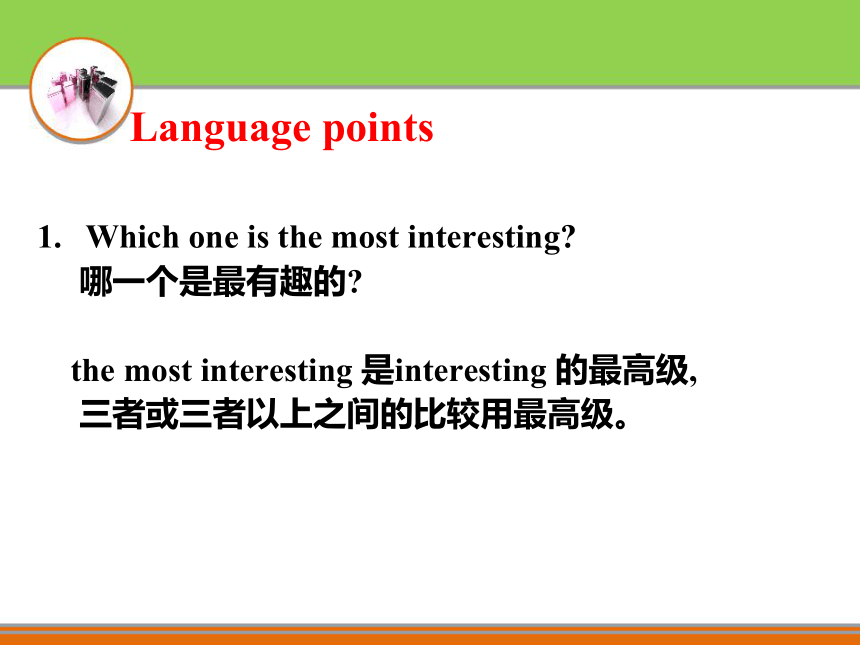
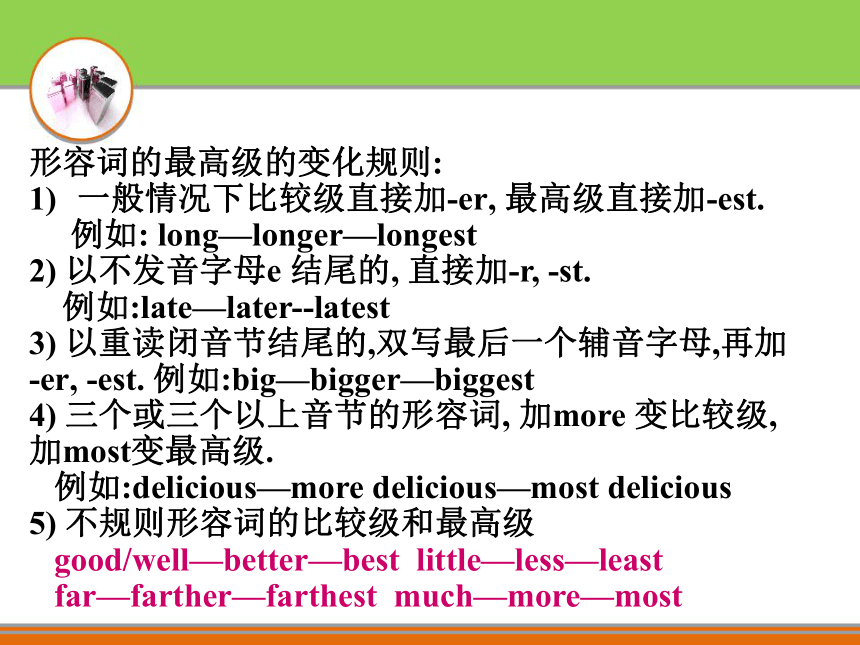
文档简介
(共24张PPT)
Lesson 11
Lily Learns about China!
Food and Drink
Noodles
Dumplings
Tea
Festivals
Children’s Day
National Day
Spring Festival
Mid-Autumn Day
Places of Interest
The Great Wall
The Palace Museum
Traditional Stories
The story of Chang’e
The story of Meng Jiangnv
The story of Ma Liang
How beautiful China is!
We must study hard for China to make it more beautiful.
I love China
I love China! Do you like it
What foreign holidays do you know about
Learn the passage, and find what Lily knows about China.
Language points
Which one is the most interesting
哪一个是最有趣的
the most interesting 是interesting 的最高级,
三者或三者以上之间的比较用最高级。
形容词的最高级的变化规则:
一般情况下比较级直接加-er, 最高级直接加-est.
例如: long—longer—longest
2) 以不发音字母e 结尾的, 直接加-r, -st.
例如:late—later--latest
3) 以重读闭音节结尾的,双写最后一个辅音字母,再加-er, -est. 例如:big—bigger—biggest
4) 三个或三个以上音节的形容词, 加more 变比较级,加most变最高级.
例如:delicious—more delicious—most delicious
5) 不规则形容词的比较级和最高级
good/well—better—best little—less—least
far—farther—farthest much—more—most
2. We learn about different countries of the world.
我们了解了世界上不同的国家。
learn “学习,学会”.
例如:learn music 学音乐 learn English 学英语
2) 与about, of连用,表示“听说,了解到,得知”
例如:We learned about the news this morning.
今天早上我才得知那个消息.
3) learn后跟that 引导的宾语从句, 表示“获悉,得知”
We learned that he was in France.我获悉他在法国.
4) “听到,意识到” 例如:
We are glad to learn that he teaches us English this term.
听说他本学期教我们英语,我们感到高兴.
5) learn的过去式有两种,learned 或learnt,在美语中多用learned,在英语中多用learnt.
3.Recently, my class has learned about China.
最近,我们学习了中国。
recently副词, 意为“最近,不久前,近来”,指过去不久的某一时刻,与一般过去式连用 ;指过去不久到现在的一段时间,和现在完成时连用,形容词是recent”新近的;近来的”。
eg. My mother went to Nanjing recently.
我妈妈不久前去了南京。
I haven’t seen Li Ming recently.
我最近没有看到李明。
4.Our teacher once worked in southern China. 我们的老师曾在中国的南部工作过。
southern 形容词,意为“南部的;来自南方的”。它是由名词south(南;南方) 在词尾加上-ern构成的形容词。 South 和southern 在句中可以进行同义句转换。类似的词还有northern, eastern, western.
We like living in southern China.
We like living in the south of China.
We like living in the southern part of China.
我们喜欢住在中国南方
5.I love being a tourist and seeing new things! 我喜欢成为一名游客,见识新事物!
tourist 可数名词,意为“游客;游人;观光者”。由tour加后缀-ist构成的名词。 Tour既可用作名词也可用作动词,意为“旅行;游历;观光”。
Why does the tourist want to go to the post office 这名游客为什么想去邮局?
We’ll tour the world. 我们将周游世界。
6. A few days ago, our teacher took us to a Chinese grocery store and a Chinese restaurant. 几天前,我们老师带我们去了一个中国杂货店和一个中国饭店。
1)took 是take的过去式。”take…to…“ 把某人带到某地
Please take the box to the next room.
请把这个箱子搬到隔壁的屋子。
His father always takes him to the park on Sunday.
每逢星期天,他的父亲总是带他去公园。
2)grocery store 意为“杂货店”。
I often go to the grocery store. 我经常去杂货店。
7.Mother’s Day and Father’s Day 母亲节和父亲节。
Mother’s Day and Father’s Day 是单数名词家’s 构成,以s结尾的复数名词只加’, 不以s结尾的复数名词仍要加’s.
Children’s Day儿童节, Women’s Day 妇女节Teachers’ Day教师节
Have a try
1. What’s the name of Lily’s favourite restaurant
2. Does Lily love Chinese food
3. Do they have Chinese restaurants in their city
Beijing Beijing Peking House.
Yes.
Yes, they have.
Make a dialogue and act it out
A: Hi Lily, Nice to meet you.
Irfan: Hi, Nice to meet you.
A: Do you know some Chinese festivals
Irfan: Yes, I know Spring Festival……
……
A: Bye!
Irfan: Good-bye!
考考你的记忆力,根据句意及首字母补全单词。 1. The g________ store had many food. 2. The Chinese r___________ (餐馆) is great. 3. My favourite subject is social studies. It’s so
i ___________. 4. I love to t _______(旅游) 5. I learned about Chinese f_________ (节日)
rocery
estaurant
nteresting
ravel
estivals
慧眼识珠,单项选择。 1. June 1 is ______ Day. A. children’s B. Child’s
C. Children D. Children’s 2. —______ did Tom go on weekend —He went to the mountains. A. What B. When C. How D. Where
D
D
3. He often plays ______ chess, but doesn’t
play _____ violin. A. /; the B. the; / C. a; the D. the; the 4. ______ is your address A. Where B. What C. How D. Which 5. ______ is the weather like A. How B. What
C. How much D. How many
A
B
B
Homework
Irfan has learned a lot about China.
Think of some things he may not
know about your hometown.
Write a letter to Irfan about them.
Lesson 11
Lily Learns about China!
Food and Drink
Noodles
Dumplings
Tea
Festivals
Children’s Day
National Day
Spring Festival
Mid-Autumn Day
Places of Interest
The Great Wall
The Palace Museum
Traditional Stories
The story of Chang’e
The story of Meng Jiangnv
The story of Ma Liang
How beautiful China is!
We must study hard for China to make it more beautiful.
I love China
I love China! Do you like it
What foreign holidays do you know about
Learn the passage, and find what Lily knows about China.
Language points
Which one is the most interesting
哪一个是最有趣的
the most interesting 是interesting 的最高级,
三者或三者以上之间的比较用最高级。
形容词的最高级的变化规则:
一般情况下比较级直接加-er, 最高级直接加-est.
例如: long—longer—longest
2) 以不发音字母e 结尾的, 直接加-r, -st.
例如:late—later--latest
3) 以重读闭音节结尾的,双写最后一个辅音字母,再加-er, -est. 例如:big—bigger—biggest
4) 三个或三个以上音节的形容词, 加more 变比较级,加most变最高级.
例如:delicious—more delicious—most delicious
5) 不规则形容词的比较级和最高级
good/well—better—best little—less—least
far—farther—farthest much—more—most
2. We learn about different countries of the world.
我们了解了世界上不同的国家。
learn “学习,学会”.
例如:learn music 学音乐 learn English 学英语
2) 与about, of连用,表示“听说,了解到,得知”
例如:We learned about the news this morning.
今天早上我才得知那个消息.
3) learn后跟that 引导的宾语从句, 表示“获悉,得知”
We learned that he was in France.我获悉他在法国.
4) “听到,意识到” 例如:
We are glad to learn that he teaches us English this term.
听说他本学期教我们英语,我们感到高兴.
5) learn的过去式有两种,learned 或learnt,在美语中多用learned,在英语中多用learnt.
3.Recently, my class has learned about China.
最近,我们学习了中国。
recently副词, 意为“最近,不久前,近来”,指过去不久的某一时刻,与一般过去式连用 ;指过去不久到现在的一段时间,和现在完成时连用,形容词是recent”新近的;近来的”。
eg. My mother went to Nanjing recently.
我妈妈不久前去了南京。
I haven’t seen Li Ming recently.
我最近没有看到李明。
4.Our teacher once worked in southern China. 我们的老师曾在中国的南部工作过。
southern 形容词,意为“南部的;来自南方的”。它是由名词south(南;南方) 在词尾加上-ern构成的形容词。 South 和southern 在句中可以进行同义句转换。类似的词还有northern, eastern, western.
We like living in southern China.
We like living in the south of China.
We like living in the southern part of China.
我们喜欢住在中国南方
5.I love being a tourist and seeing new things! 我喜欢成为一名游客,见识新事物!
tourist 可数名词,意为“游客;游人;观光者”。由tour加后缀-ist构成的名词。 Tour既可用作名词也可用作动词,意为“旅行;游历;观光”。
Why does the tourist want to go to the post office 这名游客为什么想去邮局?
We’ll tour the world. 我们将周游世界。
6. A few days ago, our teacher took us to a Chinese grocery store and a Chinese restaurant. 几天前,我们老师带我们去了一个中国杂货店和一个中国饭店。
1)took 是take的过去式。”take…to…“ 把某人带到某地
Please take the box to the next room.
请把这个箱子搬到隔壁的屋子。
His father always takes him to the park on Sunday.
每逢星期天,他的父亲总是带他去公园。
2)grocery store 意为“杂货店”。
I often go to the grocery store. 我经常去杂货店。
7.Mother’s Day and Father’s Day 母亲节和父亲节。
Mother’s Day and Father’s Day 是单数名词家’s 构成,以s结尾的复数名词只加’, 不以s结尾的复数名词仍要加’s.
Children’s Day儿童节, Women’s Day 妇女节Teachers’ Day教师节
Have a try
1. What’s the name of Lily’s favourite restaurant
2. Does Lily love Chinese food
3. Do they have Chinese restaurants in their city
Beijing Beijing Peking House.
Yes.
Yes, they have.
Make a dialogue and act it out
A: Hi Lily, Nice to meet you.
Irfan: Hi, Nice to meet you.
A: Do you know some Chinese festivals
Irfan: Yes, I know Spring Festival……
……
A: Bye!
Irfan: Good-bye!
考考你的记忆力,根据句意及首字母补全单词。 1. The g________ store had many food. 2. The Chinese r___________ (餐馆) is great. 3. My favourite subject is social studies. It’s so
i ___________. 4. I love to t _______(旅游) 5. I learned about Chinese f_________ (节日)
rocery
estaurant
nteresting
ravel
estivals
慧眼识珠,单项选择。 1. June 1 is ______ Day. A. children’s B. Child’s
C. Children D. Children’s 2. —______ did Tom go on weekend —He went to the mountains. A. What B. When C. How D. Where
D
D
3. He often plays ______ chess, but doesn’t
play _____ violin. A. /; the B. the; / C. a; the D. the; the 4. ______ is your address A. Where B. What C. How D. Which 5. ______ is the weather like A. How B. What
C. How much D. How many
A
B
B
Homework
Irfan has learned a lot about China.
Think of some things he may not
know about your hometown.
Write a letter to Irfan about them.
同课章节目录
- Unit 1 Me and My Class
- Lesson 1 Back to School!
- Lesson 2 Many Faces, One Picture
- Lesson 3 Getting to Know You!
- Lesson 4 Best Friends
- Lesson 5 Meet Ms. Liu
- Lesson 6 Jenny's Week
- Unit 2 My Favourite School Subject
- Lesson 7 Don't Be Late for Class!
- Lesson 8 E-mail Helpers!
- Lesson 9 I Don't Want to Miss Geography !
- Lesson 10 Looking for Lisa
- Lesson 11 Lily Learns about China !
- Lesson 12 Karen's Hair Stood Up!
- Unit Review
- Unit 3 Families Celebrate Togethe
- Lesson 13 I Love Autumn
- Lesson 14 Happy Memories
- Lesson 15 A Present for Li Ming!
- Lesson 16 Happy Thanksgiving!
- Lesson 17 Presents from Canada!
- Lesson 18 Li Ming's Birthday
- Unit Review
- Unit 4 My Neighbourhood
- Lesson 19 The Best Neighourhood
- Lesson 20 No Stopping!
- Lesson 21 Eat a Donut and Turn Right
- Lesson 22 I Like My Neighbourhood
- Lesson 23 People in My Neighbourhood
- Lesson 24 I Need a Map!
- Unit Review
- Unit 5 My Future
- Lesson 25 I Want to Be a Teacher!
- Lesson 26 What Will I Be ?
- Lesson 27 What's Your Advice?
- Lesson 28 Rich or Poor? It Doesn't Matter!
- Lesson 29 Our Ambitions and Dreams
- Lesson 30 A Famous Friend?
- Unit Review
- Unit 6 Go With Transportation !
- Lesson 31 How Do You Travel ?
- Lesson 32 Trains Go Faster !
- Lesson 33 Life on Wheels
- Lesson 34 Flying Donuts
- Lesson 35 Future Transportation
- Lesson 36 Clean Cars ?
- Unit Review
- Unit 7 Enjoy Your Hobby
- Lesson 37 What's Your Hobby ?
- Lesson 38 Hobbies Are Fun!
- Lesson 39 Danny's Hobby
- Lesson 40 What's Paul's Hobby?
- Lesson 41 Show and Tell!
- Lesson 42 The New Club
- Unit Review
- Unit 8 Celebrating Me
- Lesson 43 What Makes You Unique?
- Lesson 44 Georgia Plays Basketball
- Lesson 45 Be Yourself !
- Lesson 46 My Dream
- Lesson 47 I Made It !
- Lesson 48 Li Ming's Report
- Unit Review
